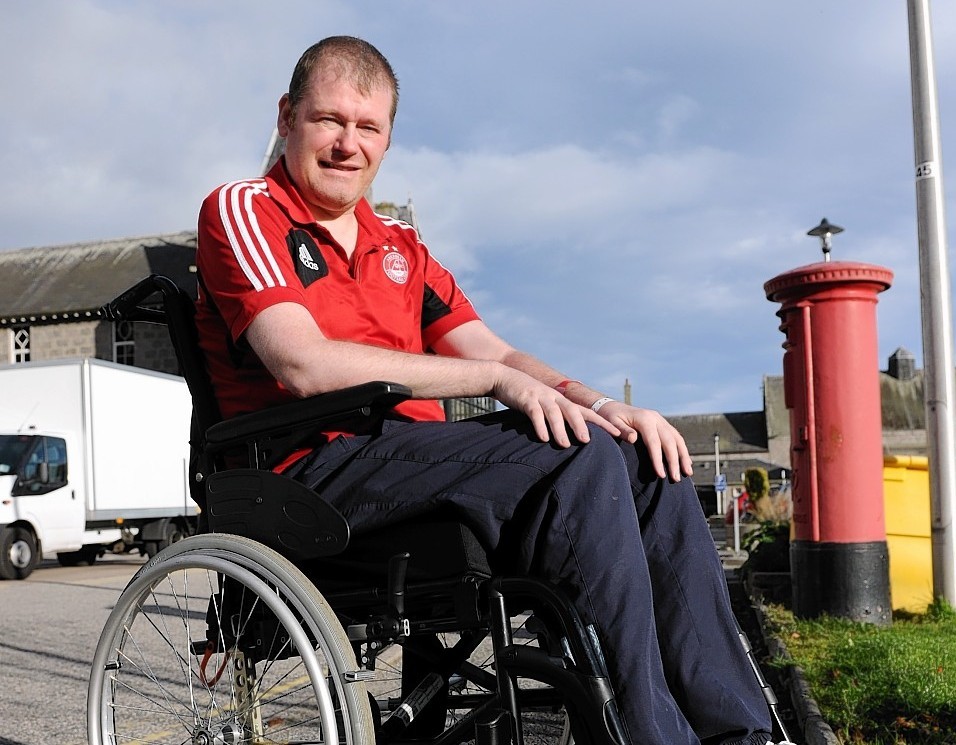It started as a common cold, but a routine virus left one north-east man paralysed from the neck down and fighting for his life.
Derek Ledingham has spent the last seven-and-a-half months in hospital, much of it in intensive care, after developing Guillain-Barré syndrome – an extremely rare condition which attacks the body’s peripheral nervous system off the back of a viral or bacterial infection.
He has only recently taken his first steps following months of rehabilitation and has set his sights on being back in his Aberdeen home by the end of the year.
The 41-year-old said it had been a terrifying experience.
“I asked the doctors ‘Is there anything we can do to prevent it?’, and they said ‘There’s nothing you can do. You have to let it run its course until it stops attacking the body'”, he said.
“This year has been a write-off for me. I came into hospital and it was winter time and I’ll leave in winter time. I have missed the whole of summer.”
Mr Ledingham, a graphic designer contracted the illness, which affects only one in two million people, after he took to the pitch for a football match because his team, Shirlaws FC, was a player down.
The following day, a Monday morning in March, he woke unable to move his legs.
Panicking and confused, he struggled to his phone, only for it to slip from his numbed hands.
He eventually managed to call his father, Alistair, but his words were slurred and barely audible.
When the senior graphic designer finally arrived at Aberdeen Royal Infirmary for emergency treatment, doctors were initially baffled.
He had the symptoms of a severe stroke, but his heart was fine.
And that was only the beginning of his ordeal.
Within days he had lost control of his arms, was struggling to breathe and was transferred to intensive care, where his condition worsened until he was almost totally paralysed.
It was then that specialists realised he had Guillain-Barré syndrome, an after-effect of the winter cold he had been unable to shift.
Mr Ledingham, who works for Tag Worldwide, said: “I had a cold last New Year and I couldn’t shake it. Eventually my runny nose stopped, but I kept on coughing.
“I started to feel really tired every single day and couldn’t place why. I thought I maybe just needed a good weekend to catch up on my sleep.
“On the Sunday morning it started I woke up and felt like I had a dead leg. It was bizarre, but I didn’t think anything of it.”
He went to his football team’s match against Dyce, as planned, and found only 10 of the players had shown up, so pulled on his kit and played, despite feeling under the weather.
By the following day, he was an invalid.
“On the Monday morning I woke up and both my legs were just gone,” he said.
“We got to ARI and they thought I had the symptoms of a stroke.
“On the Tuesday morning when I woke, I couldn’t get out of bed. I couldn’t move my arms, I couldn’t eat. They said you’re going to get worse before you get better, but by mid-afternoon, I was struggling to breathe and I was hiked up to intensive care.
“I kept thinking ‘I haven’t done anything wrong here, I just had a cold’.”
About 80% of the people who contract Guillain-Barré syndrome do recover, but the process can take anywhere between several weeks and a year.
Mr Ledingham would spend the next seven-and-a-half months in hospital, losing a large amount of weight and muscle strength in the process.
He was transferred to Woodend hospital’s neuro-rehabilitation unit in May to begin the long, slow road to recovery.
“The first week or two I was saying ‘why has it happened to me?’ And then it was a case of saying ‘it has happened to me and I’ll fight it’,” he said.
“I’m quite determined – in this situation, you have to be. If you feel sorry for yourself you’ll never got out of it.
“Now I can walk, I can feed myself. Everyday I’m getting stronger and stronger.”
